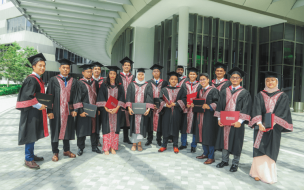At the center of this rapidly developing region lies Malaysia. As one of the largest economies in the ASEAN network, the country operates as a global business hub.
Malaysia is known for its production of palm oil, energy reserves, and manufacturing expertise. Yet, the country aims to emphasize sustainability at the heart of its business practices, pledging to cut greenhouse gas emissions by 45% by 2030.
Here are 4 reasons to study in Malaysia for your MBA.
1. Gain greater cultural awareness
Malaysia is a rich melting pot, home to several different nationalities.
This means that choosing to study abroad in Malaysia for business school will involve rubbing shoulders with people from varying corners of the globe.
This is exactly what the Asia School of Business (ASB) MBA, located in Kuala Lumpur, is like. Each intake typically comprises around 60% international students and 16-20 nationalities.
Working alongside people from different global locations is a great opportunity to enhance your cultural awareness, believes Jake Cohen, interim dean at ASB and senior associate dean at MIT Sloan School of Management.
The ASB MBA was formed in partnership with MIT, so the program has close links with the leading US school.
“Regardless of which companies students end up in post-MBA, they're going to have to engage with Asia. And it's important for them to really appreciate the richness of the culture, the people, and witness how the economies are developing and emerging,” says Jake.
2. The networking benefits are endless when you study in Malaysia
There’s no denying the value of networking at business school so joining a program that’s brimming with opportunities to meet new people and potential employers is a must.
The ASB MBA program hosts 'Action Learning' projects across the 12-month program. These projects enable students to get involved in real-world projects with ASB’s corporate partners across Asia.
“The fact that students have the chance to go to Indonesia, see what's happening in Vietnam, see how things work in Cambodia, or how things are different in India or China is quite remarkable,” says Jake.
The projects allow students to practice the skills and business lessons they’ve gained from their MBA courses.
Alongside traditional business and management courses, ASB offers courses in Data Analytics, Politics and Non-Market Strategies, and Digital Marketing.
The faculty is made up of residential ASB Faculty and visiting MIT Sloan Faculty, which means students gain a blend of Eastern and Western perspectives on the business world.
“The nice thing about the partnership with MIT, and the richness of Asia, is that it's not just faculty from MIT flying to campus or teaching. Rather, students get to immerse themselves in the region through the pedagogy of MIT,” says Jake.
3. Benefit from booming career prospects
Studying for an MBA in Malaysia will mean gaining access to the thriving Southeast Asian jobs market.
The Career Development Office holds regular career events with top consulting companies such as McKinsey, Boston Consulting Group (BCG), and Bain & Company, as well as top tech, finance, and manufacturing firms.
For students who study in Malaysia at ASB, however, it doesn’t stop there, believes Jake, as he explains that the global links between ASB and MIT Sloan broaden students’ career prospects.
ASB MBAs are invited to visit and immerse themselves at the MIT campus in Cambridge, Massachusetts, for up to three weeks.
There’s also an opportunity for ASB MBA grads to study the Master of Science in Management Studies (MSMS) STEM-designated degree—a program that’s exclusively available to MIT’s partner schools. The MSMS enables students to gain a visa to work in the US for up to three years.
ASB grads enter an array of sectors after graduation, including technology, manufacturing, finance, and sustainability.
Some ASB MBA grads have gone on to launch careers at Amazon, Samsung, and McKinsey in the US, while others have used their degree to progress in project management roles at AirAsia in Indonesia or Kraft Heinz in the UAE.
4. Experience an abundance of scenic sights
If you’re interested in immersing yourself in a place with beautiful scenery and plenty of outdoor activities, Malaysia offers all this and more.
With the capital city being home to cultural landmarks such as Batu Caves and Petronas Towers, as well as a vibrant nightlife scene, it’s difficult to get bored.
At ASB, there are also opportunities to visit neighboring islands, such as Batu-Batu, during MBA sustainability projects, which offer a great opportunity to learn about eco-tourism and renewable energy generation.
For those looking to travel further afield, the ‘Industry Treks’ take MBA students to global business destinations, such as Dubai and Abu Dhabi, to learn about its business culture and network with potential employers.
For those who choose to study in Kuala Lumpur, having a base in the center of Southeast Asia, is invaluable to MBA students, believes Jake.
“Asia is a great place to be for business school because the East is rising, and rising very fast,” he says.








